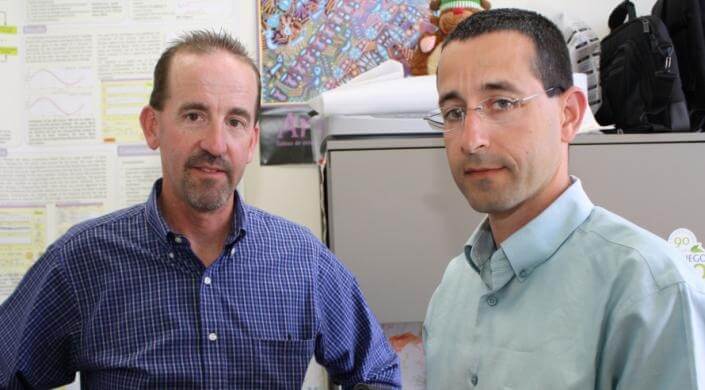News
Francis J. Doyle III, John A. Paulson dean and John A. & Elizabeth S. Armstrong Professor of Engineering & Applied Sciences, and Eyal Dassau, senior research fellow in biomedical engineering, will partner with researchers from DreaMed Diabetes and with Prof. Moshe Phillip from Schneider Children’s Medical Center of Israel, to optimize therapy options for patients with type 1 diabetes who receive multiple daily injections of insulin and that use point of care capillary glucose measurements.
PETAH TIKVA, ISRAEL and CAMBRIDGE, MA, May 9, 2017 - Researchers from the Harvard John A. Paulson School of Engineering and Applied Sciences (SEAS); DreaMed Diabetes, developer of diabetes treatment and management solutions; and Schneider Children’s Medical Center have entered a research collaboration agreement for improving insulin management for individuals living with type 1 diabetes.
Dr. Eyal Dassau, senior research fellow in biomedical engineering and Francis J. Doyle III, dean of SEAS, will partner with researchers from DreaMed Diabetes and with Prof. Moshe Phillip from Schneider Children’s Medical Center of Israel, to optimize therapy options for patients with type 1 diabetes who receive multiple daily injections of insulin and that use point of care capillary glucose measurements.
Eran Atlas, CEO of DreaMed, explained, “A large fraction of people with type 1 diabetes do not use an insulin pump and a continuous glucose monitor for various reasons, but rather rely on glucometers and insulin injections. Currently, there is no available data on the insulin injection habits of this type 1 population. In the age of “smart”, connected devices, in which the insulin injections will be registered in the patients' smartphone and data will be gathered in cloud-based platforms, we find an opportunity to collect accurate data on the majority of type 1 patients and to develop a product that will help them better control their disease.”
Eyal Dassau, Study PI at SEAS, stated, “Our collective work on the development of automated algorithms for insulin management and clinical evaluation of this new technology will enable us to develop a novel dosing support system for patients on MDI and to improve care for many that are not using insulin pumps.”
Francis J. Doyle III, Dean of SEAS, stated, “This partnership represents many years of experience in algorithms development for automated glucose control, sometimes referred to as artificial pancreas systems, including extensive clinical validation.”
Moshe Phillip, MD, Chairman and Chief Scientific Officer of DreaMed Diabetes, and Director of the Institute for Endocrinology and Diabetes, Schneider Children’s Medical Center of Israel, commented, “Patients with type 1 diabetes under multiple daily injections (MDI) therapy and their physicians rely on personalized information which includes cumulative data on past glucose and insulin levels, as well as detailed information of the amount and time of all meals and physical activity of the patients. This retrospective analysis is time consuming and requires a high degree of expertise. In addition, evidence show that most of the type 1 diabetes patients do not reach the glucose control goals set by the various agencies. Therefore, there is a need to develop additional tools and algorithms to assist both physicians and patients to better optimize patient’s treatment profile in order to improve glucose control outcomes in the type 1 diabetes population.”
About Glucose Control
Insulin dependent diabetes is a growing global health problem that affects more than 90 million people worldwide. Glucose control is the primary factor in avoiding the most severe complications of diabetes. In spite of advancement in insulin therapy and devices for glucose measurement, most patients do not achieve their target glucose control and are vulnerable to permanent and costly complications. The global market for products for the management of diabetes is $41 billion and is estimated to grow to over $114 billion by 2018. Insulin-dependent patients represent approximately 50% of the global population of individuals with diabetes, which is growing by about 6 percent annually.
Cutting-edge science delivered direct to your inbox.
Join the Harvard SEAS mailing list.
Press Contact
Leah Burrows | 617-496-1351 | lburrows@seas.harvard.edu
